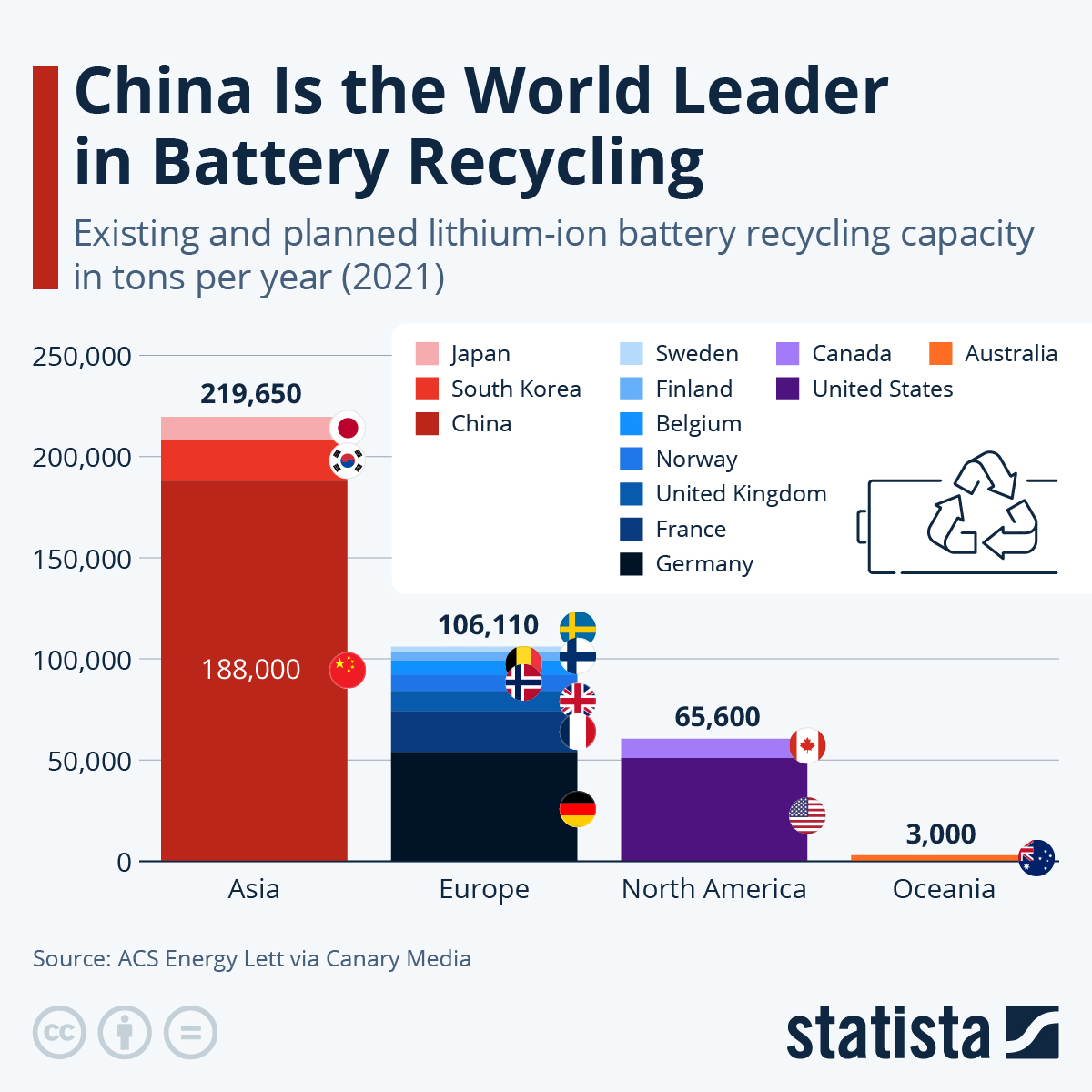
As many countries around the world scramble towards a green transition, a new era of electric cars is being ushered in and with it comes the need for batteries.
While these batteries - also needed for home, industrial and grid energy storage - are being newly manufactured, Statista's Anna Fleck reports that the market for the recycling of lithium-ion batteries is growing too, especially since it “conserves the critical minerals and other valuable materials that are used in batteries and is a more sustainable approach than disposal”, as the U.S. Environmental Protection Agency writes.
Data from ACS Energy Lett cited in an article by Maria Virginia Olano on Canary Media shows how China was the leading country for this type of battery recycling in 2021, with 188,000 tons of existing and planned lithium-ion battery recycling capacity per year. It was followed by Germany and the United States, albeit with both countries lagging some way behind.
You will find more infographics at Statista
Since 2021, there have been even more plans for the expansion of lithium-ion battery recycling plants. According to researchers at the Fraunhofer Institute for Systems and Innovation Research, while the majority of lithium-ion battery recycling capacity is located in East Asia, Europe is also building capacity and could increase its recycling capacities to an estimated 400,000 tons per year by 2025.
The extent to which policy exists on battery recycling varies greatly by country and region. For example, the European Council has now agreed to set the target for lithium recovery from waste batteries to 50 percent by 2027 and 80 percent in 2031 and has said that there will be a new rule on mandatory minimum levels of recycled content for industrial, SLI batteries and EV batteries. Olano of Canary Media argues that it’s the comparative lack of policy supporting the growth of lithium-ion battery recycling in the U.S. in past years that has held the country back in this regard, falling behind markets in Asia and Europe.
One Bloomberg analysis says, however, that the recycling industry has “boomed too soon” in the U.S., as there are too many recycling plants and not enough discarded batteries to recycle, and “there won't be for more than a decade”.
As many countries around the world scramble towards a green transition, a new era of electric cars is being ushered in and with it comes the need for batteries.
While these batteries – also needed for home, industrial and grid energy storage – are being newly manufactured, Statista’s Anna Fleck reports that the market for the recycling of lithium-ion batteries is growing too, especially since it “conserves the critical minerals and other valuable materials that are used in batteries and is a more sustainable approach than disposal”, as the U.S. Environmental Protection Agency writes.
Data from ACS Energy Lett cited in an article by Maria Virginia Olano on Canary Media shows how China was the leading country for this type of battery recycling in 2021, with 188,000 tons of existing and planned lithium-ion battery recycling capacity per year. It was followed by Germany and the United States, albeit with both countries lagging some way behind.
You will find more infographics at Statista
Since 2021, there have been even more plans for the expansion of lithium-ion battery recycling plants. According to researchers at the Fraunhofer Institute for Systems and Innovation Research, while the majority of lithium-ion battery recycling capacity is located in East Asia, Europe is also building capacity and could increase its recycling capacities to an estimated 400,000 tons per year by 2025.
The extent to which policy exists on battery recycling varies greatly by country and region. For example, the European Council has now agreed to set the target for lithium recovery from waste batteries to 50 percent by 2027 and 80 percent in 2031 and has said that there will be a new rule on mandatory minimum levels of recycled content for industrial, SLI batteries and EV batteries. Olano of Canary Media argues that it’s the comparative lack of policy supporting the growth of lithium-ion battery recycling in the U.S. in past years that has held the country back in this regard, falling behind markets in Asia and Europe.
One Bloomberg analysis says, however, that the recycling industry has “boomed too soon” in the U.S., as there are too many recycling plants and not enough discarded batteries to recycle, and “there won’t be for more than a decade”.
Loading…



